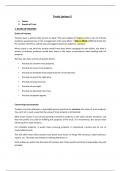Trusts Lecture 3
1. Duties
2. Breach of Trust
1. DUTIES OF TRUSTEES
Duties of trustees
Trustees have a general duty of care to apply “the same degree of diligence that a man of ordinary
prudence would exercise in the management of his own affairs.” [Raes v Meek [1889] 16 R (HL) 31].
His conduct, therefore, will be measured against external, objective, standard.
What counts is not what the trustee would have done when managing his own affairs, but what a
person of ordinary prudence would have done in the same circumstances when dealing with his
property.
But they also have a series of specific duties:
• the duty to conserve trust property.
• the duty to secure trust property.
• the duty to distribute trust property to the correct persons.
• the duty to pay at the right time.
• the duty to keep accounts.
• the duty of oversight.
• the duty to administer the trust.
• the duty to appoint agents.
Conserving trust property
Trustees must do whatever a reasonable person would do to conserve the value of trust property.
You can't act in such a way that the value of trust property is diminished.
Most trusts involve a sum of money being invested in property, in the stock market, whatever, and
then the profits are used for fulfilling the purposes of the trust. For investments, this would mean
refraining from risky ventures.
For heritable property, it would mean ensuring property is maintained, insured and let out to
responsible tenants.
This will often mean that trustees must spend trust funds on things like insurance, expert advisors,
repairs, etc. This duty may extend to making alterations or
Such outlays are within the discretion of trustees, but if they spend trust funds irresponsibly, they will
be liable.
, It is not possible to seek the approval of a court ahead of time for a capital expenditure. This means
trustees must take particular care in using capital funds as they will be liable for any negligent
spending. It's not the court's job to provide that kind of oversight for individual trustees.
If the trustees fail in the duty to conserve, they will be personally liable for any loss.
Securing trust property
Trustees must secure the property, meaning they must take possession into their own hands and
retain title over it. You have to retain possession of it.
If the trustees allow property to remain in the hands of a third party, they will be personally liable for
any loss.
If the trust has cash, those funds should be in a bank in a trust account, not in your personal account.
Trust funds held by a bank should be held in a separate trust account controlled by all trustees jointly
or by the trust solicitor.
MacKenzie Stuart in The Law of Trusts (1932): “[I]t is the duty of a trustee to take possession of the
estate, and to have transferred into the name of the trustees to the extent that no individual trustee
or third party can use it for other than trust purposes. If he allows trust estate to remain in the hands
of a third party, or of a law agent, without reducing it into the possession of trust, he incurs the risk of
personal liability if it should be lost. Belief in the integrity of the party holding the property of the
trust is no excuse.” [p.200]
If you put trust property outside of your own possession into the hands of a third party, you take on
the responsibility for anything that happens. It doesn't matter if you think the third party is really
trustworthy. Doesn't matter if you think that the third party is just someone you met in the pub and
he seems like an okay dude. If you put trust property outside of your possession, outside of the
trustees' position, into the hands of a third party, you are liable for anything that happens.
The duty to distribute
Trusts are predicated on the idea that the trustees will at some point be distributing a benefit to the
beneficiaries. Most commonly it involves the trustees taking the profits from investments and giving
them to the beneficiaries.
Trustees must distribute funds to the correct persons, whether beneficiaries or creditors.
MacKenzie Stuart in The Law of Trusts says “[A] trustee in distributing the estate must hand over or
pay it to the party who, under the trust, is entitled to receive it, and he is liable to that party if he pays
it to any other.”
90 odd years ago, Professor Mackenzie Stuart laid out the duty of distribution, your duty to pay the
money to whoever is entitled to receive it. And if you pay it to someone else, you will be liable. From
time to time, this question comes up in exams. It came up a couple of years ago. A question was set
about what happens when trustees pay in good faith the wrong person?




